Unit 8 Have you read Treasure Island yet? Section B Period 4 课件(共57张PPT)
文档属性
| 名称 | Unit 8 Have you read Treasure Island yet? Section B Period 4 课件(共57张PPT) | 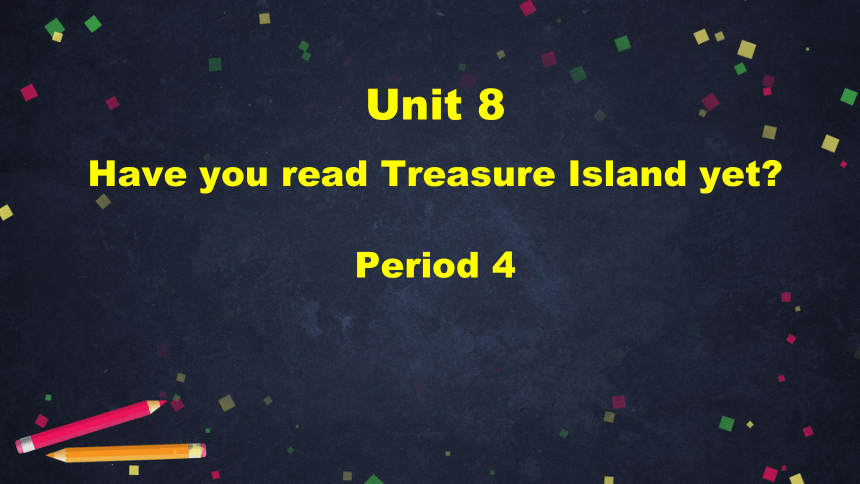 | |
| 格式 | zip | ||
| 文件大小 | 1.8MB | ||
| 资源类型 | 教案 | ||
| 版本资源 | 人教新目标(Go for it)版 | ||
| 科目 | 英语 | ||
| 更新时间 | 2020-06-21 09:29:40 | ||
图片预览

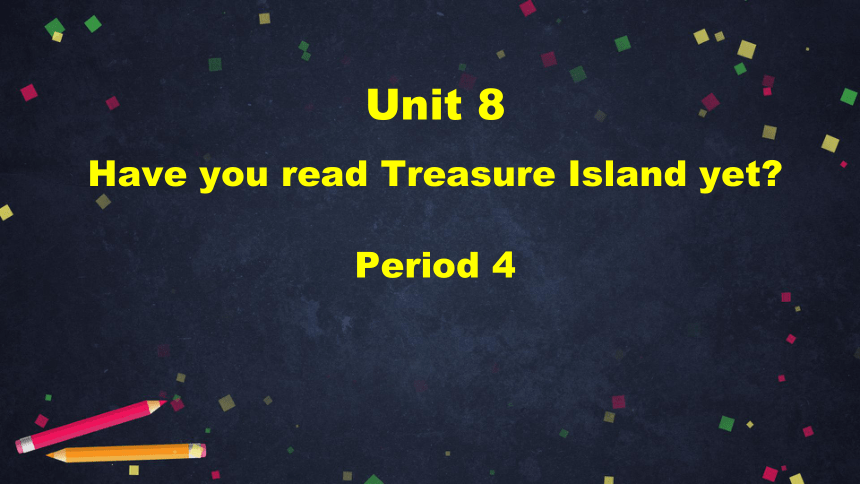


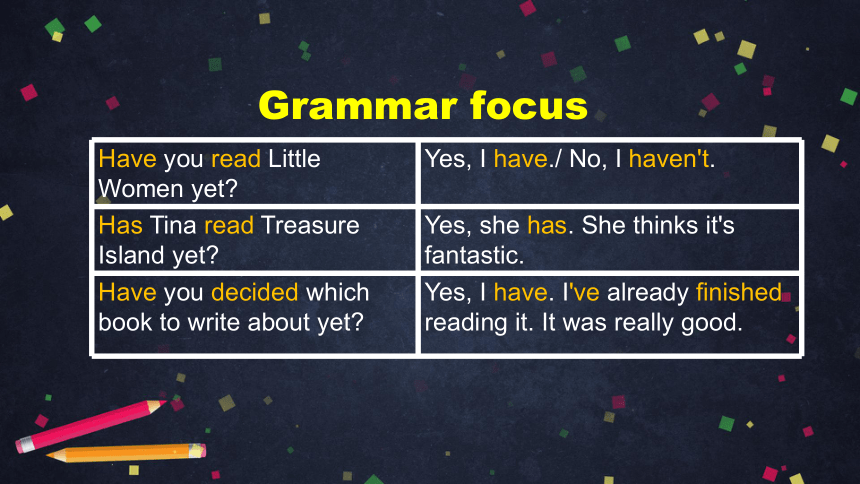
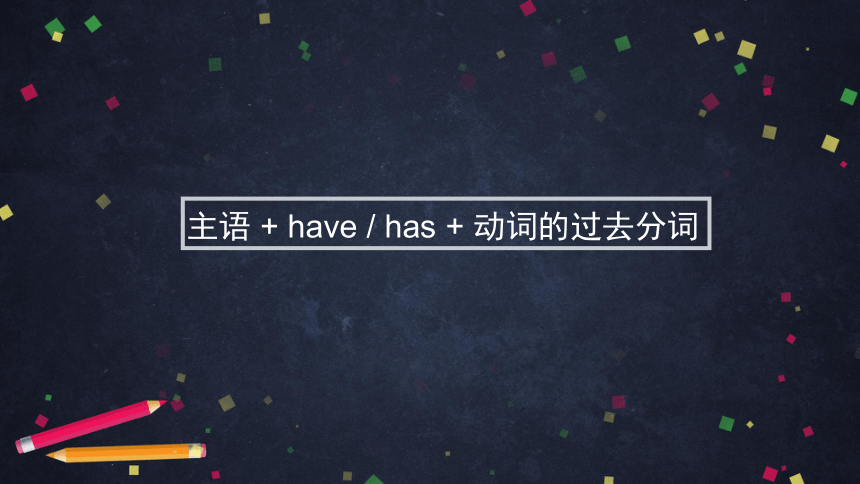
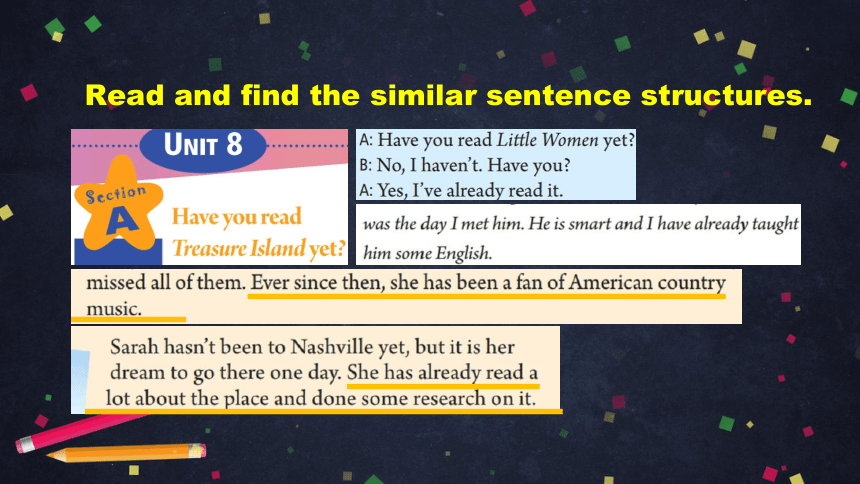
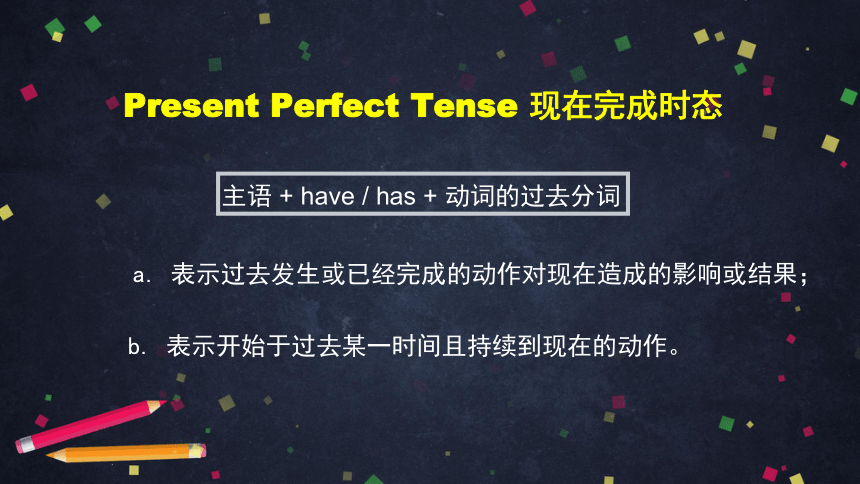
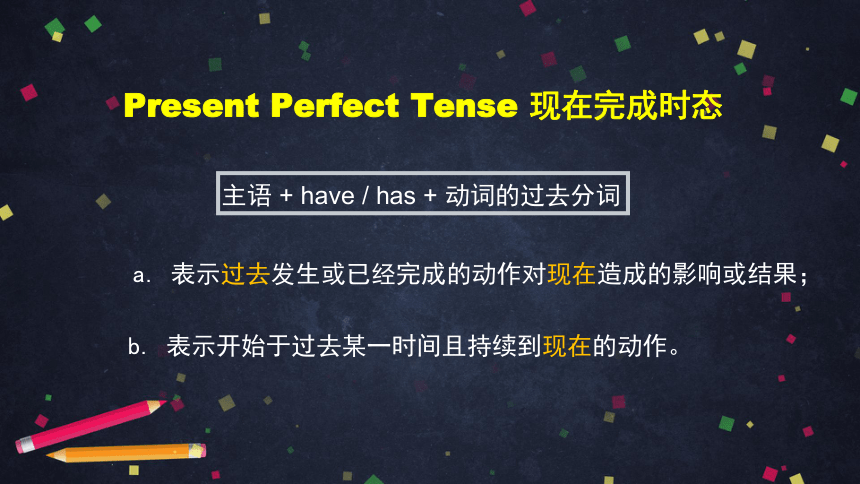
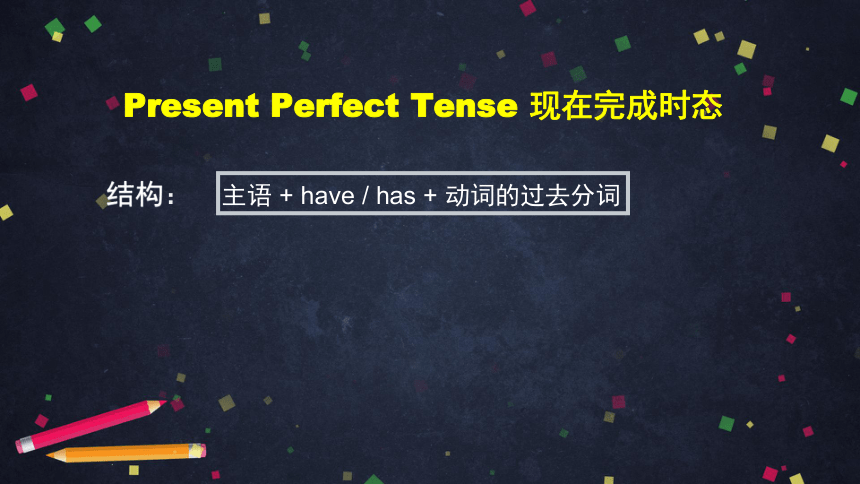

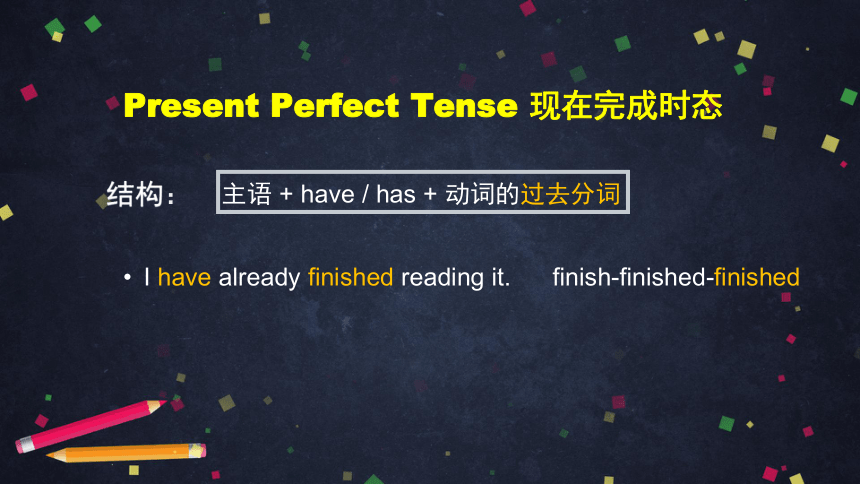
文档简介
(共57张PPT)
Unit
8
Have
you
read
Treasure
Island
yet?
Period
4
Unit
8
Have
you
read
Treasure
Island
yet?
Period
4
Your
Goals
By
the
end
of
this
period,
you
will
be
able
to
1)
learn
about
the
past
participle
forms
of
verbs;
2)
know
the
structure
and
functions
of
the
Present
Perfect
Tense;
3)
use
“already”
and
“yet”
in
the
Perfect
Tense;
4)
identify
the
differences
between
the
Present
Perfect
Tense
and
the
Past
Simple
Tense.
Grammar
focus
Have
you
read
Little
Women
yet?
Yes,
I
have./
No,
I
haven’t.
Has
Tina
read
Treasure
Island
yet?
Yes,
she
has.
She
thinks
it’s
fantastic.
Have
you
decided
which
book
to
write
about
yet?
Yes,
I
have.
I’ve
already
finished
reading
it.
It
was
really
good.
Grammar
focus
Have
you
read
Little
Women
yet?
Yes,
I
have./
No,
I
haven't.
Has
Tina
read
Treasure
Island
yet?
Yes,
she
has.
She
thinks
it's
fantastic.
Have
you
decided
which
book
to
write
about
yet?
Yes,
I
have.
I've
already
finished
reading
it.
It
was
really
good.
主语
+
have
/
has
+
动词的过去分词
Read
and
find
the
similar
sentence
structures.
Present
Perfect
Tense
现在完成时态
主语
+
have
/
has
+
动词的过去分词
a.
表示过去发生或已经完成的动作对现在造成的影响或结果;
b.
表示开始于过去某一时间且持续到现在的动作。
Present
Perfect
Tense
现在完成时态
主语
+
have
/
has
+
动词的过去分词
a.
表示过去发生或已经完成的动作对现在造成的影响或结果;
b.
表示开始于过去某一时间且持续到现在的动作。
Present
Perfect
Tense
现在完成时态
主语
+
have
/
has
+
动词的过去分词
结构:
Present
Perfect
Tense
现在完成时态
主语
+
have
/
has
+
动词的过去分词
结构:
助动词
Present
Perfect
Tense
现在完成时态
主语
+
have
/
has
+
动词的过去分词
结构:
I
have
already
finished
reading
it.
finish-finished-finished
Present
Perfect
Tense
现在完成时态
主语
+
have
/
has
+
动词的过去分词
结构:
decide-decided-decided
be-was
/
were-been
find-found-found
bring-brought-brought
lose-lost-lost
teach-taught-taught
cut-cut-cut
read-read-read
Present
Perfect
Tense
现在完成时态
finish-finished-finished
kill-killed-killed
stop-stopped-stopped
die-died-died
study-
studied-studied
过去分词的变化:
规律变化
Present
Perfect
Tense
现在完成时态
read-read-read
put-put-put
cut-cut-cut
hurt-hurt-hurt
let-let-let
cost-cost-cost
过去分词的变化:
不规律变化
A-A-A
Present
Perfect
Tense
现在完成时态
think-thought-thought
find-found-found
teach-taught-taught
lose-lost-lost
buy-bought-bought
tell-told-told
bring-brought-brought
meet-met-met
过去分词的变化:
不规律变化
A-B-B
Present
Perfect
Tense
现在完成时态
see-saw-seen
go-went-gone
do-did-done
take-took-taken
drink-drank-drunk
choose-chose-chosen
过去分词的变化:
不规律变化
A-B-C
Present
Perfect
Tense
现在完成时态
run-ran-run
come-came-come
become-became-become
过去分词的变化:
不规律变化
A-B-A
Present
Perfect
Tense
现在完成时态
regular
构成规则与过去式一致
irregular
A-A-A
A-B-B
A-B-C
A-B-A
过去分词的变化:
Write
down
the
correct
forms
of
verbs.
1.
Excuse
me.
Have
you
(see)
my
dictionary?
2.
Have
you
(find)
your
wallet
yet?
3.
I
have
(put)
on
my
coat.
seen
found
put
Present
Perfect
Tense
现在完成时态
主语
+
have
/
has
+
动词的过去分词
句式:
肯定式
I
/
You
/
We
/
They
have
done
the
work.
He
/
She
/
It
has
done
the
work.
they
have=
they’ve
he
has
=
he’s
Present
Perfect
Tense
现在完成时态
主语
+
have
/
has
+
动词的过去分词
句式:
否定式
I
/
You
/
We
/
They
have
not
done
the
work.
He
/
She
/
It
has
not
done
the
work.
have
not
=
haven’t
has
not
=
hasn’t
Present
Perfect
Tense
现在完成时态
主语
+
have
/
has
+
动词的过去分词
句式:
一般疑问句及回答
Have
I
/
you
/
they
done
the
work?
Yes,
you
/
I
/
we
/
they
have.
No,
you
/
I
/
we
/
they
haven’t.
Present
Perfect
Tense
现在完成时态
主语
+
have
/
has
+
动词的过去分词
句式:
一般疑问句及回答
Has
he
/
she
/
it
done
the
work?
Yes,
he
/
she
/
it
has.
No,
he
/
she
/
it
hasn’t.
Present
Perfect
Tense
现在完成时态
主语
+
have
/
has
+
动词的过去分词
句式:
特殊疑问句
I
have
done
the
work.
What
have
you
done?
Present
Perfect
Tense
现在完成时态
意义:
a.
表示过去发生或已经完成的动作对现在造成的影响或结果;
b.
表示开始于过去某一时间且持续到现在的动作。
Present
Perfect
Tense
现在完成时态
a.
表示过去发生或已经完成的动作对现在造成的影响或结果;
past
I
had
breakfast.
I’m
not
hungry
now.
now
I
have
just
had
my
breakfast.
现在我不饿。
a.
常和recently,
just,
already,
never,
ever,
yet,
so
far,
before,
…times(次数)等状语连用。
多强调动作完成,不强调动作的持续。
Present
Perfect
Tense
现在完成时态
e.g.
Have
you
_____read
this
book?
I
have
_______
read
this
book.
I
haven’t
read
this
book
____.
ever
already
yet
常见的时间状语:
Has
he
ever
seen
this
film?
He
has
already
seen
this
film.
He
has
just
seen
this
film.
He
hasn’t
seen
this
film
yet.
He
has
seen
50
films
so
far.
She
hasn’t
seen
this
film
before.
I
have
seen
this
film
twice.
“已经”,肯定句
“刚刚”,肯定句
“还”,疑问句
/
否定句
“曾经”,疑问句
/
肯定句
“迄今为止”,句末
“以前”,句末
“次数”,句末
Present
Perfect
Tense
现在完成时态
b.
表示开始于过去某个时间且持续到现在的动作。
past
I
moved
here
in
1990.
I
still
live
here.
now
I
have
lived
here
for
30
years.
I
have
lived
here
since
1990
/
30
years
ago.
常见的时间状语:
b.
for
和
since。动作或状态从过去一直持续到现在。
Present
Perfect
Tense
现在完成时态
(1)
for
+
表示一段时间的短语
(2)
since
+
表示过去时间点的词语
(3)
since
+
表示过去时间的时间状语从句
常见的时间状语:
b.
for
和
since。动作或状态从过去一直持续到现在。
Present
Perfect
Tense
现在完成时态
e.g.
I
have
been
a
teacher
______
20
years.
He
has
been
at
this
school
_______
1990.
We
have
learned
2,000
English
words
______
we
came
to
this
school.
for
since
since
I
have
cleaned
my
room.
我已经打扫过我的房间了。
I
cleaned
my
room
last
week.
我上周打扫了我的房间。
(My
room
is
clean
now.)
(I
did
it
in
the
past.)
现在完成时与一般过去时的区别
She
has
gone
to
Japan.
她已经去日本了。
(She
went
to
Japan
and
she
isn’t
here
now.)
现在完成时与一般过去时的区别
现在完成时与一般过去时的区别
【现在完成时】
表示过去发生或已经完成的动作对现在造成的影响或结果,或从过去开始一直延续到现在的动作或保持的状态。
强调的是现在的情况,不能和表示过去的时间状语连用。
现在完成时与一般过去时的区别
【一般过去时】
只表示过去的动作或状态。
不强调和现在的关系(即动作或状态在现在已经结束)。它可以和表示过去的时间状语用。
You
needn’t
describe
her.
I
her
several
times.
have
met
met
am
meeting
had
met
2.
Miss
Brown,
we
?
cleaning
our
classroom.
Can
we
go
home
now?
finish
B.
finishing
C.
are
finished
D.
have
finished
3.
I
my
homework;
I
guess
I
can’t
join
you.
A.
don’t
finish
B.
didn’t
finish
C.
haven’t
finished
D.
won’t
finish
4.
-
Who
is
Jerry
Cooper?
-
?
I
saw
you
shaking
hands
with
him
at
the
meeting.
Don’t
you
meet
him
yet?
B.
hadn’t
you
met
him
yet?
C.
Didn’t
you
meet
him
yet?
D.
Haven’t
you
met
him
yet?
5.
-
Why
not
go
into
the
classroom?
-
The
door
locked.
have
been
B.
will
be
C.
has
been
D.
is
Use
the
words
in
brackets
to
complete
the
conversations.
I
have
just
drunk
some
tea
4a
1.
A:
Would
you
like
something
to
drink?
B:
No,
thanks.
.
(just
/
drink
some
tea)
Use
the
words
in
brackets
to
complete
the
conversations.
4a
2.
A:
I
heard
you
lost
your
key.
?
(find)
B:No,
not
yet.
Have
you
found
it
yet
Use
the
words
in
brackets
to
complete
the
conversations.
4a
3.
A:
Do
you
know
when
Tom
is
leaving?
B:
.
(already
/
leave)
A:
When
?
(leave)
B:
This
morning.
He
has
already
left
did
he
leave
Use
the
words
in
brackets
to
complete
the
conversations.
4a
4.
A:
Is
your
sister
going
to
the
movies
with
us
tonight?
B:
No.
.
(already
/
see
the
film)
She
has
already
seen
the
film
Use
the
words
in
brackets
to
complete
the
conversations.
4a
5.
A:
What
do
your
parents
think
about
our
plan?
B:
I
.
(not
/
tell
them
/
yet)
haven’t
told
them
yet
Fill
in
the
blanks
with
the
correct
forms
of
the
words
in
brackets.
4b
Sally
(love)
reading.
In
the
morning,
she
reads
the
newspaper
and
in
the
evening
she
reads
books.
She
already
(read)
more
than
100
different
books!
Her
favorite
kind
of
books
is
science
fiction.
She
is
interested
in
science
and
technology
and
loves
to
imagine
what
the
world
(be)
like
in
50
years.
loves
has
read
will
be
She
(finish)
reading
a
book
about
robots
last
week
and
________
(write)
a
book
report
about
it
next
week
for
her
French
class.
Every
time
she
is
in
the
library,
Sally
looks
at
the
many
books
she
(not
read)
yet
and
she
can’t
wait
to
read
them!
finished
will
write
has
not
read
Fill
in
the
blanks
with
the
correct
forms
of
the
words
in
brackets.
4b
Make
a
list
of
the
things
you
have
done
and
the
ones
you
haven’t
done
yet
this
week.
Then
ask
another
student.
P64:3
you
(
)
student’s
name
Things
I
have
done
Things
I
haven’t
done
Example:
This
week,
I
have
done
so
many
things.
I
have
read
3
books…
But,
I
still
haven’t
finished
my
plan…
Useful
expressions
Many
songs
these
days
are
just
…,such
as
the
importance
of
money
and
success.
success
名词
succeed
动词
succeed
in
在……方面成功
e.g.
Confidence
is
the
key
to
success.
They
built
her
up
into
a
great
success.
If
you
succeed
in
your
mission,
you
will
be
congratulated.
Useful
expressions
Oliver
Twist
is
about
a
boy
who
goes
out
to
sea
and
finds
an
island
full
of
treasures.
(be)
full
of
充满……的
fill
with
装满……
be
filled
with
=
be
full
of
e.g.
The
bottle
is
full
of
water.
She
always
looks
full
of
energy.
The
room
is
filled
with
heavy
smoke.
.
Useful
expressions
The
book
report
is
due
in
two
weeks.
due:形容词,意为预定,预期。
e.g.
Rose
is
due
to
start
school
in
September.
due
to
由于,归因于
e.g.
The
team’s
success
was
largely
due
to
her
efforts.
Useful
expressions
She
came
to
realize
how
much
she
actually
missed
all
of
them.
come
to
do
sth.
终于,逐渐……,表达达到某种状态。
e.g.
How
did
you
come
to
know
him?
come
to
do
sth.
还可以表示来做某事。
e.g.
Would
you
like
to
come
to
help
me
with
the
housework?
.
Useful
expressions
Many
songs
these
days
are
just
about
modern
life
in
the
US,
…,
but
not
about
belonging
to
a
group.
belong
to
属于
e.g.
It
must
belong
to
Tom.=
It
must
be
Tom’s.
belonging
稳定关系,归属感
a
sense
of
belonging
belongings
财产,所有物
e.g.
I
need
to
sort
my
belongings.
.
Useful
expressions
It
reminds
us
that
the
best
things
in
life
are
free
…
remind
提醒,使想起
remind
sb
that
…
remind
sb
to
do
sth.
remind
(sb)
of
sth.
e.g.
In
case
I
forget,
please
remind
me
of
my
promise.
Homework
1.
分类背诵课本第136页和137页的不规则动词表。
2.
完成学习单的练习。
Thanks
for
listening!
Unit
8
Have
you
read
Treasure
Island
yet?
Period
4
Unit
8
Have
you
read
Treasure
Island
yet?
Period
4
Your
Goals
By
the
end
of
this
period,
you
will
be
able
to
1)
learn
about
the
past
participle
forms
of
verbs;
2)
know
the
structure
and
functions
of
the
Present
Perfect
Tense;
3)
use
“already”
and
“yet”
in
the
Perfect
Tense;
4)
identify
the
differences
between
the
Present
Perfect
Tense
and
the
Past
Simple
Tense.
Grammar
focus
Have
you
read
Little
Women
yet?
Yes,
I
have./
No,
I
haven’t.
Has
Tina
read
Treasure
Island
yet?
Yes,
she
has.
She
thinks
it’s
fantastic.
Have
you
decided
which
book
to
write
about
yet?
Yes,
I
have.
I’ve
already
finished
reading
it.
It
was
really
good.
Grammar
focus
Have
you
read
Little
Women
yet?
Yes,
I
have./
No,
I
haven't.
Has
Tina
read
Treasure
Island
yet?
Yes,
she
has.
She
thinks
it's
fantastic.
Have
you
decided
which
book
to
write
about
yet?
Yes,
I
have.
I've
already
finished
reading
it.
It
was
really
good.
主语
+
have
/
has
+
动词的过去分词
Read
and
find
the
similar
sentence
structures.
Present
Perfect
Tense
现在完成时态
主语
+
have
/
has
+
动词的过去分词
a.
表示过去发生或已经完成的动作对现在造成的影响或结果;
b.
表示开始于过去某一时间且持续到现在的动作。
Present
Perfect
Tense
现在完成时态
主语
+
have
/
has
+
动词的过去分词
a.
表示过去发生或已经完成的动作对现在造成的影响或结果;
b.
表示开始于过去某一时间且持续到现在的动作。
Present
Perfect
Tense
现在完成时态
主语
+
have
/
has
+
动词的过去分词
结构:
Present
Perfect
Tense
现在完成时态
主语
+
have
/
has
+
动词的过去分词
结构:
助动词
Present
Perfect
Tense
现在完成时态
主语
+
have
/
has
+
动词的过去分词
结构:
I
have
already
finished
reading
it.
finish-finished-finished
Present
Perfect
Tense
现在完成时态
主语
+
have
/
has
+
动词的过去分词
结构:
decide-decided-decided
be-was
/
were-been
find-found-found
bring-brought-brought
lose-lost-lost
teach-taught-taught
cut-cut-cut
read-read-read
Present
Perfect
Tense
现在完成时态
finish-finished-finished
kill-killed-killed
stop-stopped-stopped
die-died-died
study-
studied-studied
过去分词的变化:
规律变化
Present
Perfect
Tense
现在完成时态
read-read-read
put-put-put
cut-cut-cut
hurt-hurt-hurt
let-let-let
cost-cost-cost
过去分词的变化:
不规律变化
A-A-A
Present
Perfect
Tense
现在完成时态
think-thought-thought
find-found-found
teach-taught-taught
lose-lost-lost
buy-bought-bought
tell-told-told
bring-brought-brought
meet-met-met
过去分词的变化:
不规律变化
A-B-B
Present
Perfect
Tense
现在完成时态
see-saw-seen
go-went-gone
do-did-done
take-took-taken
drink-drank-drunk
choose-chose-chosen
过去分词的变化:
不规律变化
A-B-C
Present
Perfect
Tense
现在完成时态
run-ran-run
come-came-come
become-became-become
过去分词的变化:
不规律变化
A-B-A
Present
Perfect
Tense
现在完成时态
regular
构成规则与过去式一致
irregular
A-A-A
A-B-B
A-B-C
A-B-A
过去分词的变化:
Write
down
the
correct
forms
of
verbs.
1.
Excuse
me.
Have
you
(see)
my
dictionary?
2.
Have
you
(find)
your
wallet
yet?
3.
I
have
(put)
on
my
coat.
seen
found
put
Present
Perfect
Tense
现在完成时态
主语
+
have
/
has
+
动词的过去分词
句式:
肯定式
I
/
You
/
We
/
They
have
done
the
work.
He
/
She
/
It
has
done
the
work.
they
have=
they’ve
he
has
=
he’s
Present
Perfect
Tense
现在完成时态
主语
+
have
/
has
+
动词的过去分词
句式:
否定式
I
/
You
/
We
/
They
have
not
done
the
work.
He
/
She
/
It
has
not
done
the
work.
have
not
=
haven’t
has
not
=
hasn’t
Present
Perfect
Tense
现在完成时态
主语
+
have
/
has
+
动词的过去分词
句式:
一般疑问句及回答
Have
I
/
you
/
they
done
the
work?
Yes,
you
/
I
/
we
/
they
have.
No,
you
/
I
/
we
/
they
haven’t.
Present
Perfect
Tense
现在完成时态
主语
+
have
/
has
+
动词的过去分词
句式:
一般疑问句及回答
Has
he
/
she
/
it
done
the
work?
Yes,
he
/
she
/
it
has.
No,
he
/
she
/
it
hasn’t.
Present
Perfect
Tense
现在完成时态
主语
+
have
/
has
+
动词的过去分词
句式:
特殊疑问句
I
have
done
the
work.
What
have
you
done?
Present
Perfect
Tense
现在完成时态
意义:
a.
表示过去发生或已经完成的动作对现在造成的影响或结果;
b.
表示开始于过去某一时间且持续到现在的动作。
Present
Perfect
Tense
现在完成时态
a.
表示过去发生或已经完成的动作对现在造成的影响或结果;
past
I
had
breakfast.
I’m
not
hungry
now.
now
I
have
just
had
my
breakfast.
现在我不饿。
a.
常和recently,
just,
already,
never,
ever,
yet,
so
far,
before,
…times(次数)等状语连用。
多强调动作完成,不强调动作的持续。
Present
Perfect
Tense
现在完成时态
e.g.
Have
you
_____read
this
book?
I
have
_______
read
this
book.
I
haven’t
read
this
book
____.
ever
already
yet
常见的时间状语:
Has
he
ever
seen
this
film?
He
has
already
seen
this
film.
He
has
just
seen
this
film.
He
hasn’t
seen
this
film
yet.
He
has
seen
50
films
so
far.
She
hasn’t
seen
this
film
before.
I
have
seen
this
film
twice.
“已经”,肯定句
“刚刚”,肯定句
“还”,疑问句
/
否定句
“曾经”,疑问句
/
肯定句
“迄今为止”,句末
“以前”,句末
“次数”,句末
Present
Perfect
Tense
现在完成时态
b.
表示开始于过去某个时间且持续到现在的动作。
past
I
moved
here
in
1990.
I
still
live
here.
now
I
have
lived
here
for
30
years.
I
have
lived
here
since
1990
/
30
years
ago.
常见的时间状语:
b.
for
和
since。动作或状态从过去一直持续到现在。
Present
Perfect
Tense
现在完成时态
(1)
for
+
表示一段时间的短语
(2)
since
+
表示过去时间点的词语
(3)
since
+
表示过去时间的时间状语从句
常见的时间状语:
b.
for
和
since。动作或状态从过去一直持续到现在。
Present
Perfect
Tense
现在完成时态
e.g.
I
have
been
a
teacher
______
20
years.
He
has
been
at
this
school
_______
1990.
We
have
learned
2,000
English
words
______
we
came
to
this
school.
for
since
since
I
have
cleaned
my
room.
我已经打扫过我的房间了。
I
cleaned
my
room
last
week.
我上周打扫了我的房间。
(My
room
is
clean
now.)
(I
did
it
in
the
past.)
现在完成时与一般过去时的区别
She
has
gone
to
Japan.
她已经去日本了。
(She
went
to
Japan
and
she
isn’t
here
now.)
现在完成时与一般过去时的区别
现在完成时与一般过去时的区别
【现在完成时】
表示过去发生或已经完成的动作对现在造成的影响或结果,或从过去开始一直延续到现在的动作或保持的状态。
强调的是现在的情况,不能和表示过去的时间状语连用。
现在完成时与一般过去时的区别
【一般过去时】
只表示过去的动作或状态。
不强调和现在的关系(即动作或状态在现在已经结束)。它可以和表示过去的时间状语用。
You
needn’t
describe
her.
I
her
several
times.
have
met
met
am
meeting
had
met
2.
Miss
Brown,
we
?
cleaning
our
classroom.
Can
we
go
home
now?
finish
B.
finishing
C.
are
finished
D.
have
finished
3.
I
my
homework;
I
guess
I
can’t
join
you.
A.
don’t
finish
B.
didn’t
finish
C.
haven’t
finished
D.
won’t
finish
4.
-
Who
is
Jerry
Cooper?
-
?
I
saw
you
shaking
hands
with
him
at
the
meeting.
Don’t
you
meet
him
yet?
B.
hadn’t
you
met
him
yet?
C.
Didn’t
you
meet
him
yet?
D.
Haven’t
you
met
him
yet?
5.
-
Why
not
go
into
the
classroom?
-
The
door
locked.
have
been
B.
will
be
C.
has
been
D.
is
Use
the
words
in
brackets
to
complete
the
conversations.
I
have
just
drunk
some
tea
4a
1.
A:
Would
you
like
something
to
drink?
B:
No,
thanks.
.
(just
/
drink
some
tea)
Use
the
words
in
brackets
to
complete
the
conversations.
4a
2.
A:
I
heard
you
lost
your
key.
?
(find)
B:No,
not
yet.
Have
you
found
it
yet
Use
the
words
in
brackets
to
complete
the
conversations.
4a
3.
A:
Do
you
know
when
Tom
is
leaving?
B:
.
(already
/
leave)
A:
When
?
(leave)
B:
This
morning.
He
has
already
left
did
he
leave
Use
the
words
in
brackets
to
complete
the
conversations.
4a
4.
A:
Is
your
sister
going
to
the
movies
with
us
tonight?
B:
No.
.
(already
/
see
the
film)
She
has
already
seen
the
film
Use
the
words
in
brackets
to
complete
the
conversations.
4a
5.
A:
What
do
your
parents
think
about
our
plan?
B:
I
.
(not
/
tell
them
/
yet)
haven’t
told
them
yet
Fill
in
the
blanks
with
the
correct
forms
of
the
words
in
brackets.
4b
Sally
(love)
reading.
In
the
morning,
she
reads
the
newspaper
and
in
the
evening
she
reads
books.
She
already
(read)
more
than
100
different
books!
Her
favorite
kind
of
books
is
science
fiction.
She
is
interested
in
science
and
technology
and
loves
to
imagine
what
the
world
(be)
like
in
50
years.
loves
has
read
will
be
She
(finish)
reading
a
book
about
robots
last
week
and
________
(write)
a
book
report
about
it
next
week
for
her
French
class.
Every
time
she
is
in
the
library,
Sally
looks
at
the
many
books
she
(not
read)
yet
and
she
can’t
wait
to
read
them!
finished
will
write
has
not
read
Fill
in
the
blanks
with
the
correct
forms
of
the
words
in
brackets.
4b
Make
a
list
of
the
things
you
have
done
and
the
ones
you
haven’t
done
yet
this
week.
Then
ask
another
student.
P64:3
you
(
)
student’s
name
Things
I
have
done
Things
I
haven’t
done
Example:
This
week,
I
have
done
so
many
things.
I
have
read
3
books…
But,
I
still
haven’t
finished
my
plan…
Useful
expressions
Many
songs
these
days
are
just
…,such
as
the
importance
of
money
and
success.
success
名词
succeed
动词
succeed
in
在……方面成功
e.g.
Confidence
is
the
key
to
success.
They
built
her
up
into
a
great
success.
If
you
succeed
in
your
mission,
you
will
be
congratulated.
Useful
expressions
Oliver
Twist
is
about
a
boy
who
goes
out
to
sea
and
finds
an
island
full
of
treasures.
(be)
full
of
充满……的
fill
with
装满……
be
filled
with
=
be
full
of
e.g.
The
bottle
is
full
of
water.
She
always
looks
full
of
energy.
The
room
is
filled
with
heavy
smoke.
.
Useful
expressions
The
book
report
is
due
in
two
weeks.
due:形容词,意为预定,预期。
e.g.
Rose
is
due
to
start
school
in
September.
due
to
由于,归因于
e.g.
The
team’s
success
was
largely
due
to
her
efforts.
Useful
expressions
She
came
to
realize
how
much
she
actually
missed
all
of
them.
come
to
do
sth.
终于,逐渐……,表达达到某种状态。
e.g.
How
did
you
come
to
know
him?
come
to
do
sth.
还可以表示来做某事。
e.g.
Would
you
like
to
come
to
help
me
with
the
housework?
.
Useful
expressions
Many
songs
these
days
are
just
about
modern
life
in
the
US,
…,
but
not
about
belonging
to
a
group.
belong
to
属于
e.g.
It
must
belong
to
Tom.=
It
must
be
Tom’s.
belonging
稳定关系,归属感
a
sense
of
belonging
belongings
财产,所有物
e.g.
I
need
to
sort
my
belongings.
.
Useful
expressions
It
reminds
us
that
the
best
things
in
life
are
free
…
remind
提醒,使想起
remind
sb
that
…
remind
sb
to
do
sth.
remind
(sb)
of
sth.
e.g.
In
case
I
forget,
please
remind
me
of
my
promise.
Homework
1.
分类背诵课本第136页和137页的不规则动词表。
2.
完成学习单的练习。
Thanks
for
listening!
同课章节目录
- Unit 1 What's the matter?
- Section A
- Section B
- Unit 2 I'll help to clean up the city parks.
- Section A
- Section B
- Unit 3 Could you please clean your room?
- Section A
- Section B
- Unit 4 Why don't you talk to your parents?
- Section A
- Section B
- Unit 5 What were you doing when the rainstorm came
- Section A
- Section B
- Review of Units 1-5
- Unit 6 An old man tried to move the mountains.
- Section A
- Section B
- Unit 7 What's the highest mountain in the world?
- Section A
- Section B
- Unit 8 Have you read Treasure Island yet?
- Section A
- Section B
- Unit 9 Have you ever been to a museum?
- Section A
- Section B
- Unit 10 I've had this bike for three years.
- Section A
- Section B
